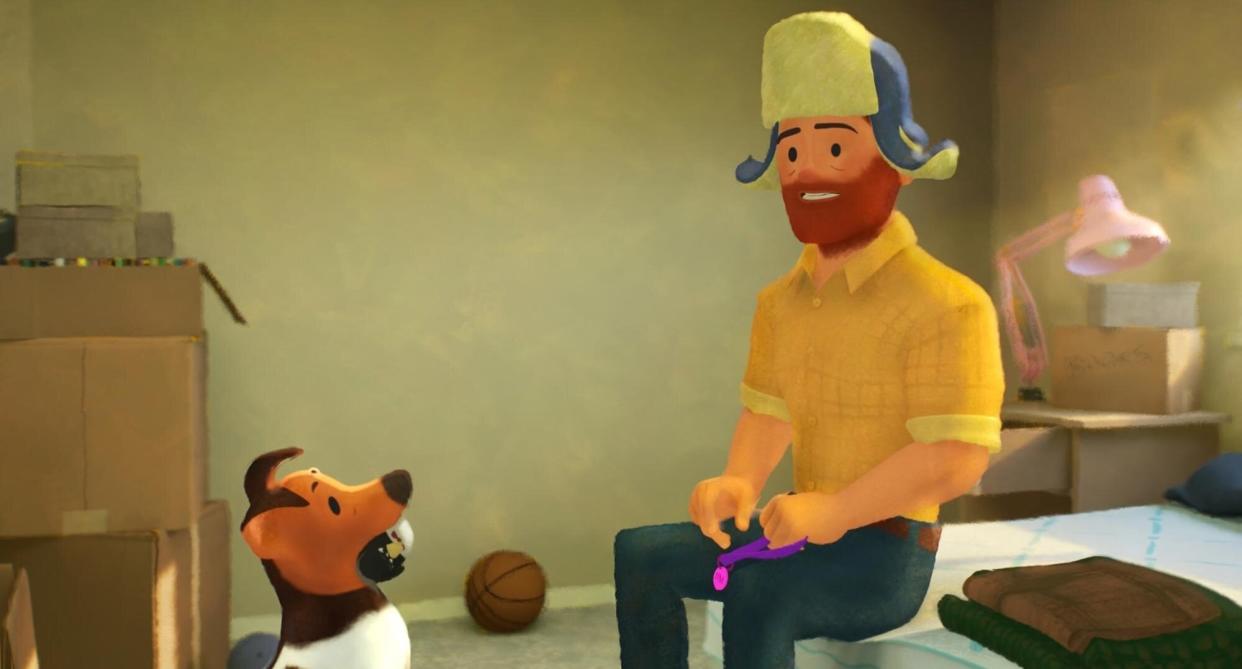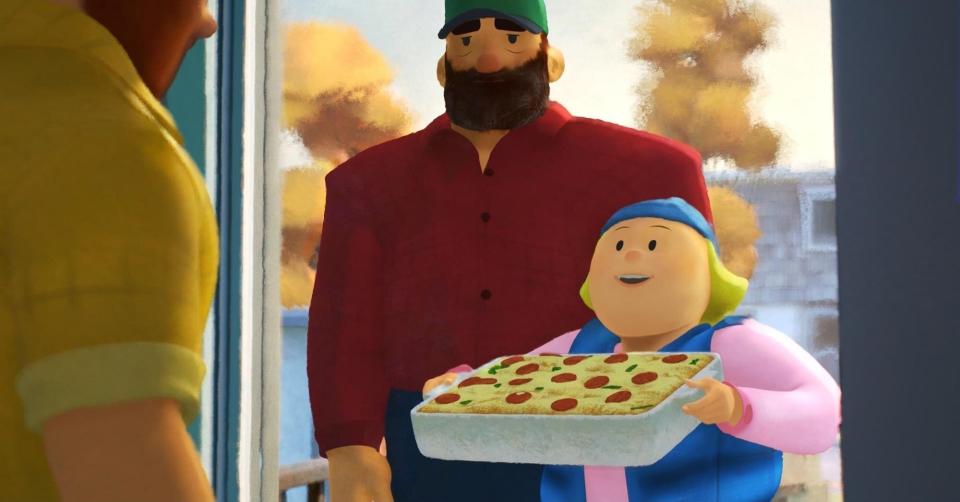Pixar's Out team on short's 'astonishing' impact: 'We're so hungry to see ourselves'

Disney/Pixar
Pixar's latest short film ran just over nine minutes. It resonated far longer.
Out, from writer-director Steven Clay Hunter and producer Max Sachar, premiered on the Disney+ streaming platform on May 22 as part of the SparkShorts series. The program gives animators and filmmakers from across Pixar — those who may not have directed a feature-length film yet — the chance to take the reins on their own short-form stories. From this emerged the studio's first work with an openly gay main character. In the story, Greg is moving in with his boyfriend, Manuel, when his parents, who don't know he's gay, surprise their son at his doorstep to help. Guiding Greg out of the closet are a pair of cosmic pets, Mags and Gigi (the "Out fairies," as Hunter and Sachar call them), who ride in on a magic rainbow to switch his body with his dog, Jim, which leads to a realization that tugs on the heartstrings — in true Pixar style.
For years, the LGBTQ community has called on Disney, the company that owns Pixar, for larger representation in theatrical movies. So while Hunter and Sachar found the initial response to Out overwhelming for what is nine minutes of animation, they understand why so many people are reacting in such passionate ways. "It tells me we're so hungry to see ourselves in stories — everybody, every walk of life," Hunter says.
"It's the first of its kind in many ways," Sachar adds of the short. "For Steve and me, and everybody we love and respect who made this film and others, we just hope it's not the last of its kind."
One of the first things shown in Out is a title card that reads, "Based on a true story." "It's somewhat based on my coming-out story and yet it's nothing like my coming-out story," Hunter explains. There were no magically fierce animals guiding his journey (that he knows of), but it is true in the sense that this story is one so many gay people have faced, the pressure of hiding your identity from family out of fear of rejection. "I was trying to make a film for my 17-year-old queer self, the guy who needed to see something of himself in a film," he says. Even the visual aesthetic is an homage to that teen, who loved the art of Mary Blair in the Little Golden Books edition of Alice in Wonderland. "They were always beautifully done watercolors or [had] a wash look to them."
The latest heartwarming tale from @Pixar’s #SparkShorts. Start streaming Out tomorrow on #DisneyPlus. pic.twitter.com/gRvBEdK1Iw
— Disney+ (@disneyplus) May 21, 2020
Hunter grew up in a small town in southwest Ontario, Canada, where nothing in media encouraged self-acceptance. "Everything about it was just, 'wrong, wrong, wrong.' Part of me just buried it," he says. (In a campy, singsong voice, he starts to sing, "Turn it off, like a light switch!" referring to the number from Broadway's Book of Mormon.) Hunter continues, "You want to just put it away and have it go away, but it doesn't go away. It stays. It keeps getting louder and shouting at you to pay attention." It's why, as he approached his 50s, he came to tears when drawing the first storyboards for Out: an image of Greg and Manuel holding each other and looking at a picture. "I had never drawn that before in my entire career at Pixar. I'd never drawn two guys in love."
Hunter and Sachar first worked together on 2008's WALL-E, Hunter as the supervising animator and Sachar as a production assistant. They reunited a decade later for Incredibles 2, which is when they started talking about collaborating on something of their own. A fan of The Twilight Zone, Hunter wanted to use Mags and Gigi, which were modeled after his brother's pets of the same names, in a Rod Serling-esque role. "The way Ron would bookend each episode, and then something weird would happen, and then he ended out," Hunter explains. "I wanted that for a queer audience." Even the text in the script about a pink and purple dog and cat emerging from a rainbow were tinted pink and purple.
That spring, they pitched the concept for Out to Jim Morris (Pixar's president) and Pete Docter (Pixar's chief creative officer, Inside Out director). It was a hold-your-breath kind of moment as the pair awaited the verdict, which, as we now know, was a green light. "There was no adversity towards the content," Hunter remembers. "They saw that we were staying true to what Pixar storytelling is. It's just telling emotional stories that make people laugh, make 'em cry." Laughter, he says, sets people "at ease, so that when you do hit them with something emotional, like we do later in the story, they're open to it."
Hunter never thought about expanding the concept of Out beyond the initial short, but fans on social media asked if there would be a sequel to "find out what happens to Greg and Manuel." Others suggested a spin-off with Mags and Gigi. "It just tells me that it's striking a chord with people," he says. But is that chord loud enough?

Disney/Pixar
While Out marks a major milestone for LGBTQ visibility in Hollywood and animation, it comes with the reminder that this representation remains largely vacant from Disney's feature-film hub. In 2016's Finding Dory, another small moment with a scene involving two women became the talk of critical essays and audience responses. There was the suggestion that they might be a same-sex couple. Before that, 2012's Brave, for which Hunter served as supervising animator, led many to ponder whether Merida was quietly Pixar's first lesbian lead, even though there was nothing explicitly stated one way or the other.
Hunter never thought she was, since the story came from a very personal place for co-director Brenda Chapman. "But we want to see ourselves in film," he adds, "so it's understandable that people would read into it. The same way with Frozen." When Walt Disney Animation prepped to roll out Frozen II, a fan campaign called for Disney to give Elsa (voiced by Idina Menzel) a girlfriend in the sequel. "I'm tired of inferring ourselves," Hunter says. "I want to see that [visibility] for real. I want to see us in film for real."
Pixar's Onward, released earlier this year, became the first movie from the studio to highlight an openly gay character with Lena Waithe's Officer Specter, who mentions in the dialogue about warming up to her girlfriend's daughter. Even though it was a passing moment, the BBC reported how many countries in the Middle East with strict homophobic laws banned the film from theaters, which speaks to the larger issue of why LGBTQ visibility on the level of Out hasn't been shown in bigger studio releases. There are many countries with censorship laws affecting films, as Disney experienced with its live-action Beauty and the Beast, which featured a blink-and-you'll-miss-it moment with Josh Gad's LeFou.
In a statement given to EW, GLAAD's director of entertainment media, Jeremy Blacklow, called Out "a huge step forward for The Walt Disney Company in establishing itself as a welcoming home for stories about all loving couples and families, including LGBTQ ones. GLAAD is thrilled to see Out's debut today on Disney+ and we're excited about its power to further LGBTQ acceptance for Disney fans around the world."
"The film industry is continuing to evolve, as it always has," Sachar says. "What makes film so amazing is it can be used to reflect a full spectrum of the world that we live in. As long as everybody gets a chance to see themselves, kids at a young age being able to point at films and characters that were memorable and speak to them on a personal level, that was the goal for us."
Sachar is currently in the early stages for a new Disney+ project, which won't debut for several years. Hunter is also helping develop pieces for the streaming platform, but says he has the "itch" now to tell more queer stories. "I have a couple ideas I'd like to get off the ground," he says. When it comes to LGBTQ main characters breaking into feature-length animated films from major studios, Hunter believes "it's just around the corner."
"Just wait for it. It's gonna happen," he adds. "We're not going anywhere. It's not like suddenly every movie's gonna be queer, but we are here and we are a part of the world and so we need to see ourselves in it."
Check out more features from Entertainment Weekly's celebration of LGBTQ pop culture.
Related content:

